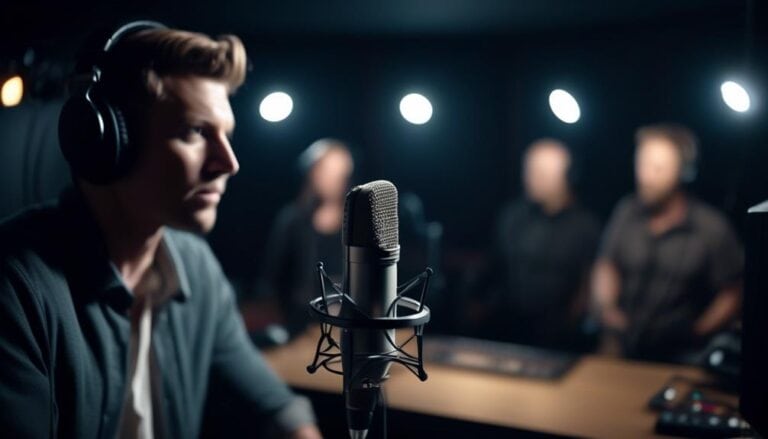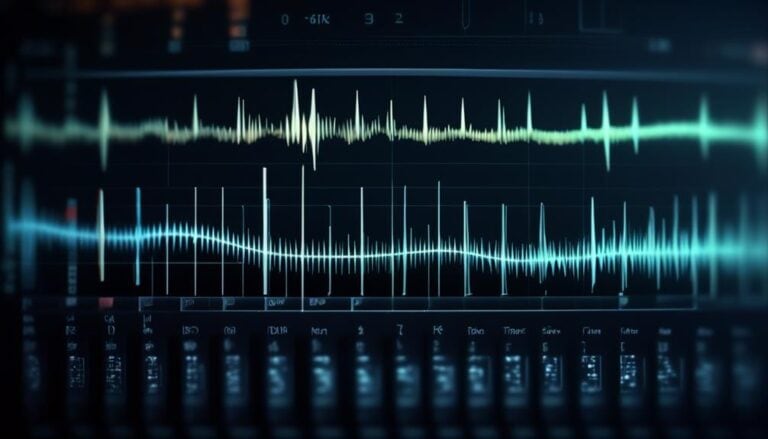Avoiding Common Pitfalls: Top Podcast Recording Mistakes to Dodge
Are you tired of your podcast episodes sounding like they were recorded in a tin can at the bottom of the ocean? Well, there's good news for you. By avoiding some common mistakes that many podcasters make, you can elevate the quality of your recordings and captivate your audience like never before.
From choosing the right microphone to mastering the art of editing, the path to podcasting success is riddled with pitfalls that can easily be sidestepped with a little know-how. So, if you're ready to take your podcast to the next level and ensure your listeners keep coming back for more, then buckle up and get ready to discover the top mistakes to dodge in your podcast recording journey.
Key Takeaways
- Select the appropriate microphone based on the recording environment to ensure optimal sound quality.
- Implement soundproofing techniques to minimize external noises and distractions for a more professional recording.
- Thoroughly prepare for each recording session by creating checklists, researching guests, and setting up equipment properly.
- Master editing skills to enhance audio clarity, remove background noise, and create a polished final product that appeals to listeners.
Poor Microphone Choice
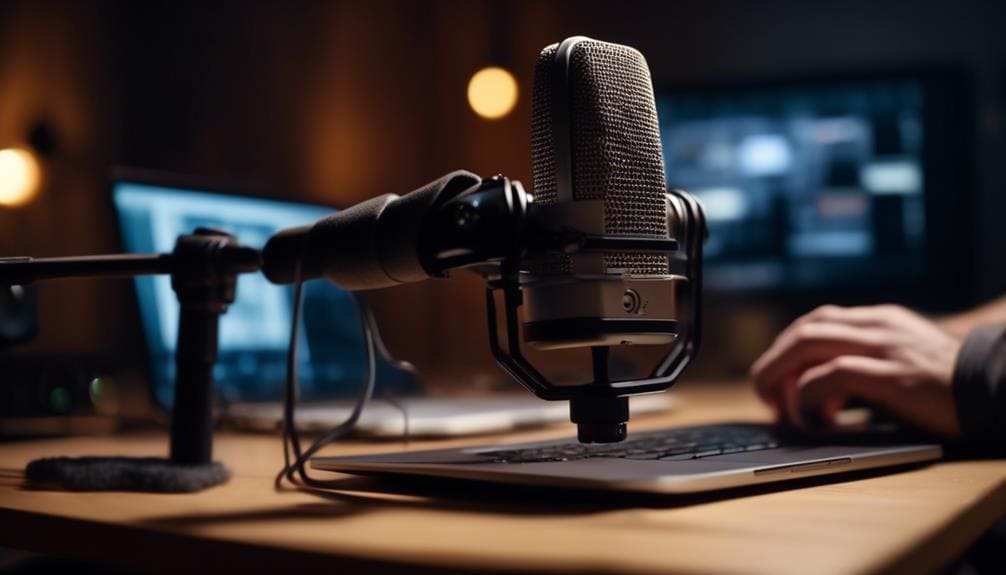
When selecting a microphone for podcast recording, ensuring you choose the right one is crucial for achieving high-quality audio. The first step in avoiding poor microphone choice is considering the recording environment. Choose a microphone that suits the acoustics of your recording space. For example, condenser microphones are excellent for capturing detailed sounds in a controlled environment, while dynamic microphones are better at reducing background noise in a less controlled setting.
Once you've chosen the right microphone, proper placement is key to capturing clear and balanced audio. Position the microphone at a distance where it can pick up your voice clearly without capturing too much room noise. Experiment with different placements to find the optimal position for your microphone based on your voice and recording environment.
Inadequate Soundproofing
To prevent sound leakage and ensure optimal audio quality in your podcast recordings, adequate soundproofing is essential. When setting up your recording space, overlooking soundproofing can lead to unwanted background noise and echoes that can greatly affect the overall sound quality of your podcast.
Here are three crucial reasons why soundproofing is key for your podcasting setup:
- Enhanced Sound Quality: Proper soundproofing helps in minimizing external noises, ensuring that your podcast recordings are clear and professional-sounding.
- Echo Reduction: Soundproofing materials absorb sound waves, reducing echoes and reverberations in your recordings, resulting in a more polished final product.
- Improved Focus: By reducing outside distractions with soundproofing, you can maintain focus while recording, leading to better delivery and overall podcast quality.
Investing time and resources into soundproofing your recording space will significantly impact the sound quality of your podcasts, creating a more immersive experience for your listeners.
Lack of Preparation
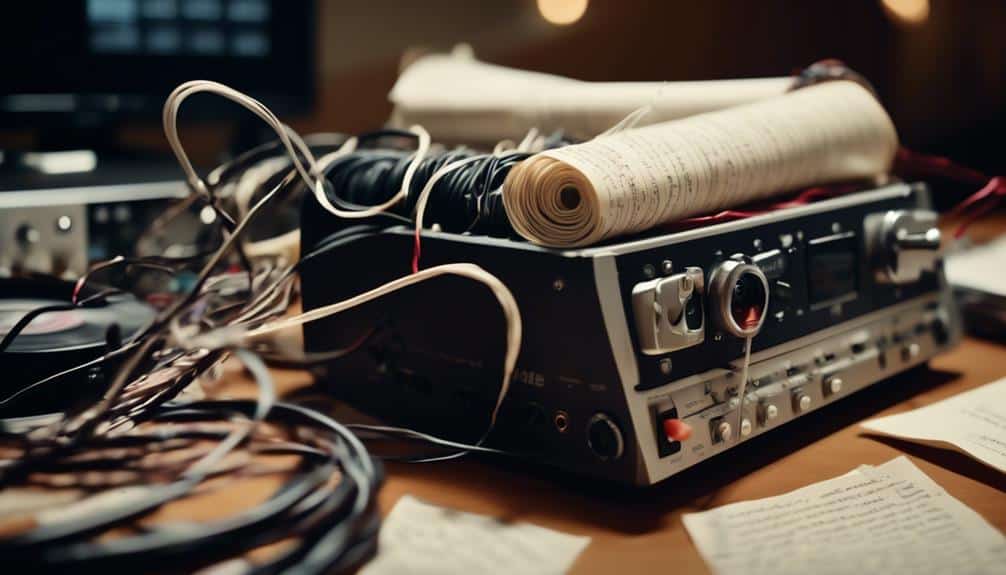
Insufficient preparation before recording your podcast can lead to a disorganized and unpolished final product. To ensure your podcast recording goes smoothly, create a pre-recording checklist. This checklist should include tasks like testing your equipment, ensuring your recording space is set up correctly, and preparing any necessary materials or notes.
When it comes to conducting interviews, having a list of well-thought-out interview question ideas can make a significant difference in the quality of your podcast. Take the time to research your guests and tailor your questions to their expertise or experiences. This preparation not only demonstrates professionalism but also helps guide the conversation in a meaningful direction.
Overlooking Editing Skills
Don't underestimate the power of mastering editing skills for your podcast. Knowing key editing techniques can make a significant difference in the quality of your final product.
Avoiding common editing mistakes will help you deliver a polished and professional podcast episode.
Editing Techniques Importance
While focusing on content creation is essential, overlooking the importance of mastering editing techniques in podcast recording can significantly impact the overall quality of your production. To ensure your podcast stands out, here are three key reasons why editing techniques matter:
- Sound Quality: Editing helps enhance audio clarity, remove background noise, and balance levels, ensuring a professional listening experience.
- Post Production Techniques: Incorporating music, sound effects, and transitions during editing can elevate the engagement and overall flow of your podcast.
- Polished Presentation: Editing allows you to trim awkward pauses, eliminate mistakes, and create a cohesive narrative, making your content more appealing to listeners.
Common Editing Mistakes
Mastering editing techniques is crucial for ensuring your podcast maintains a high level of quality and professionalism. Overlooking these skills can lead to common editing mistakes that detract from your content's impact.
Pay close attention to sound quality during editing to ensure clear and crisp audio for your listeners. Background noise can be a significant issue if not properly addressed, so make use of noise reduction tools to eliminate any distractions.
Remember, editing isn't just about cutting and pasting; it's about creating a seamless listening experience. Take the time to polish your episodes, removing any unnecessary pauses or disruptions that could hinder the flow.
Ignoring Guest Coordination
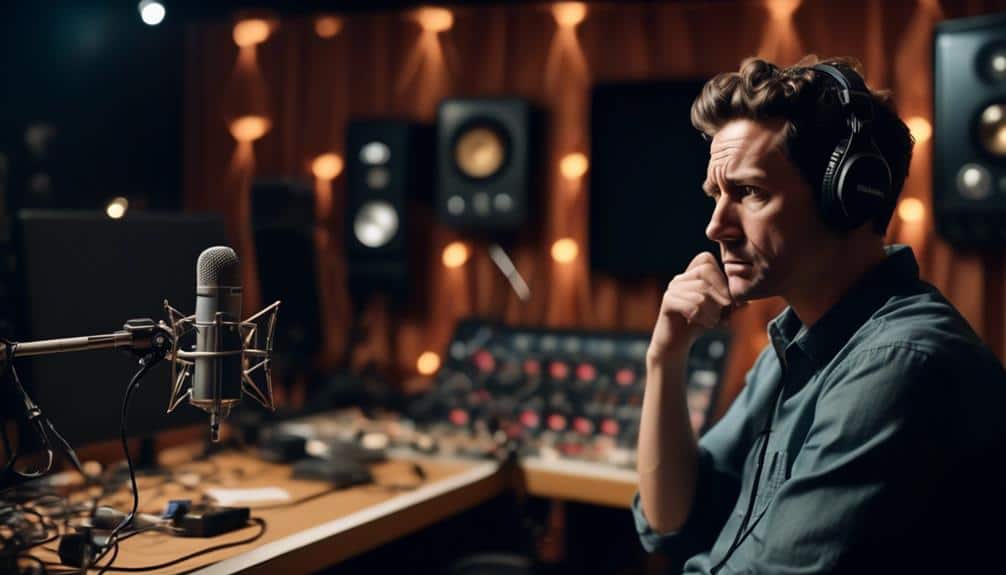
To ensure a smooth podcast recording process, it's crucial to effectively coordinate with your guests. Ignoring guest coordination can lead to various issues that may disrupt the flow of your podcast. Here are some key points to consider:
- Guest Scheduling: Properly scheduling your guests is essential to avoid last-minute cancellations or rescheduling conflicts. Make sure to communicate clearly about the date, time, and any other important details well in advance.
- Interview Etiquette: Respect your guests' time by being punctual and prepared for the interview. Show professionalism and courtesy throughout the process to make your guests feel valued and respected.
- Communication: Maintain open and clear communication with your guests to address any concerns or questions they may have. Keep them informed about the podcast format, topic of discussion, and any technical requirements to ensure a smooth recording session.
Neglecting Promotion Strategies
Properly coordinating with your guests is essential for a successful podcast recording; neglecting promotion strategies can hinder the reach and impact of your podcast. To ensure your podcast doesn't go unnoticed, leverage social media platforms and engagement tactics to promote your episodes effectively. Engaging with your audience online can significantly boost your podcast's visibility and listener base. Here are some key promotional strategies and engagement tactics you can employ:
| Promotion Strategies | Engagement Tactics | Platform |
|---|---|---|
| Share teaser clips on social media | Run contests or giveaways | |
| Collaborate with other podcasters for cross-promotion | Encourage listener feedback and questions | |
| Utilize email newsletters to notify subscribers of new episodes | Host live Q&A sessions with guests | |
| Create visually appealing graphics for each episode | Start discussions in online forums or groups |
Frequently Asked Questions
How Can I Ensure My Podcast Guests Have Quality Audio Equipment for Recording?
To ensure quality audio for your podcast guests, provide an equipment checklist beforehand. Advise them on recording setup and suggest using a reliable microphone. This preparation will enhance the overall audio quality of your podcast recordings.
What Are Some Tips for Improving My Podcast's Overall Sound Quality Without Soundproofing?
To enhance your podcast's sound quality without soundproofing, focus on microphone placement for clear audio, use editing techniques for seamless transitions. Utilize noise reduction tools and maintain audio balance for a professional sound that captivates listeners.
How Can I Effectively Manage Time During Podcast Recording Sessions?
To manage time effectively during podcast recording, streamline your process. Set clear objectives before starting, use recording efficiency techniques like batch recording, and prioritize tasks. Stay focused to boost productivity and make the most of your sessions.
What Are Some Key Elements to Focus on During the Editing Process to Enhance the Final Product?
When editing your podcast, focus on sound enhancements and post-production tweaks. Dive into audio editing for final touches that make your content stand out. These elements elevate your final product and keep listeners engaged.
How Can I Approach Potential Guests and Ensure a Smooth Coordination Process for Podcast Interviews?
When approaching potential guests, craft personalized outreach messages highlighting why they'd be a great fit. Clearly outline interview details, including date, time, and format. Be flexible and accommodating in your coordination process to ensure smooth podcast interviews.
Conclusion
In conclusion, by avoiding common podcast recording mistakes such as poor microphone choice, inadequate soundproofing, lack of preparation, overlooking editing skills, ignoring guest coordination, and neglecting promotion strategies, you can ensure a smoother and more successful podcasting experience.
Remember to stay organized, communicate effectively with guests, and promote your episodes to reach a wider audience. With careful planning and attention to detail, you can create high-quality podcast content that keeps listeners coming back for more.



